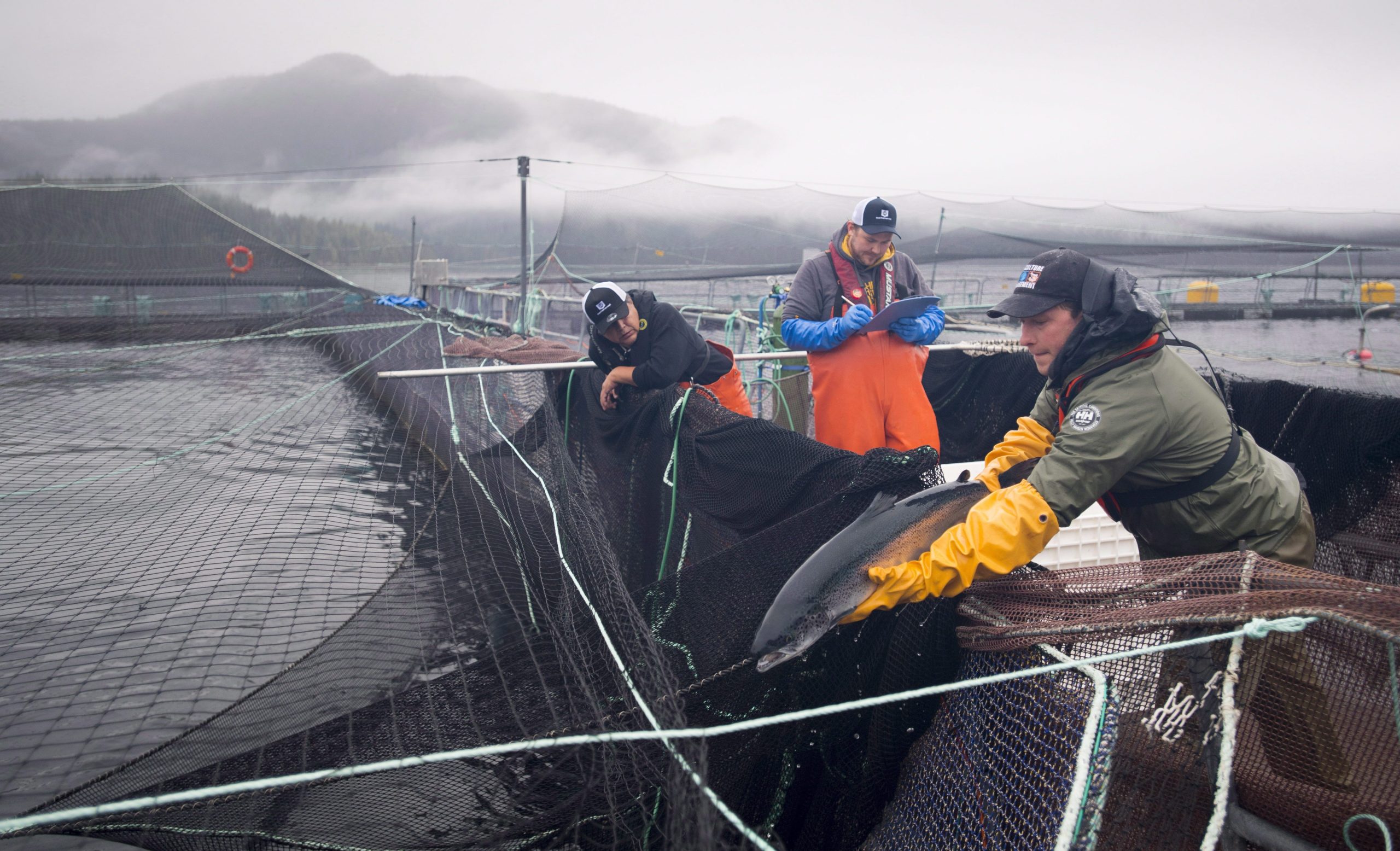Canada News
B.C. fish farm licences renewed outside Discovery Islands until at least spring 2023

Aquatic science biologist Shawn Stenhouse releases an Atlantic salmon back into its tank during a Department of Fisheries and Oceans fish health audit at the Okisollo fish farm near Campbell River, B.C. Wednesday, Oct. 31, 2018. THE CANADIAN PRESS /Jonathan Hayward
OTTAWA — Open-net salmon farming may continue off British Columbia’s coast outside the Discovery Islands area, while Ottawa undertakes consultation on a plan to transition away from the practice, the federal government announced Wednesday.
Fisheries and Oceans Canada will share a draft framework for the transition in the coming weeks and consultation will run until early 2023 with the final plan to transition 79 open-net pen farms expected to be released next spring, the department said.
A separate consultation process is underway with First Nations and licence holders for fish farms around the Discovery Islands, which are located along a key migration route for wild salmon between Vancouver Island and B.C.’s mainland.
In the meantime, the department said licences for Atlantic salmon facilities in that area are not being renewed and a final decision is expected next January.
Aquaculture operators around the Discovery Islands had already begun scaling back after the previous fisheries minister, Bernadette Jordan, announced in late 2020 that 19 salmon farms would be phased out by the end of this month.
However, a Federal Court judge set aside that decision two months ago, forcing Ottawa to rework its transition plan for the area.
Salmon farm companies Mowi Canada West, Cermaq Canada and Grieg Seafood had applied for a judicial review of the order that prevented them from restocking their farms, arguing it lacked reasons and didn’t “show an appreciation of the facts.”
In her April decision, Federal Court Judge Elizabeth Heneghan found the minister’s order breached the right to procedural fairness owed to the fish farms.
The mandate letter for Fisheries Minister Joyce Murray tasks her with transitioning fish farming out of B.C. waters by 2025.
Her department’s statement on Wednesday said Pacific salmon are facing “historic threats,” and its mandate to protect them includes moving away from open-net farms, which studies have shown can spread disease to migrating wild salmon.
The two-year licence renewals outside the Discovery Islands come with “stronger requirements,” it said, including the implementation of standardized reporting requirements and sea lice management plans, as well as wild salmon monitoring.
Ottawa is “taking action to protect and return wild salmon to abundance and ensure Canada is a global leader in sustainable aquaculture,” Murray said in the statement.
The transition plan for the aquaculture industry will include “new technology, while reducing or eliminating interactions with wild Pacific salmon,” she said.
B.C. Premier John Horgan had written to Prime Minister Justin Trudeau in March, saying any plans to move away from open-net pen salmon farms in the province should come with transition supports for the industry and its workers.
Josie Osborne, B.C.’s minister responsible for fisheries, and Fin Donnelly, parliamentary secretary for fisheries and aquaculture, said in a statement the province is committed to working with Ottawa on a transition plan for open-net farms that balances protection of wild salmon, the environment and economy, and meets B.C.’s commitment to reconciliation with First Nations.
“Our government has been exceedingly clear about the need for a comprehensive federal support plan for First Nations and communities that rely on salmon aquaculture for their livelihoods, as well as for exploring new technology and economic opportunities for the industry in these regions,” it said.
A statement from the Union of B.C. Indian Chiefs called for the consultation process to be a step toward the complete removal of fish farms from B.C. waters.
The Canadian Aquaculture Industry Alliance and B.C. Salmon Farmers Association issued a joint statement saying the decision to renew 79 licences is a “key validation of the importance of the salmon farming industry to rural, coastal communities.”
It said procedural fairness and greater certainty is needed to help build Canada’s so-called blue economy and to support an affordable food supply.
The industry wanted a six-year licence term to reflect its production cycle, and longer renewals “would have provided the confidence to further invest in innovation and technology,” alliance president Timothy Kennedy said in the statement.
The Watershed Watch Salmon Society said Ottawa has signalled that open-net salmon farming is coming to an end in B.C., but the decision “does little to protect wild salmon outside the Discovery Islands” during the two-year renewal period.
“Whether this decision offers immediate relief to wild salmon outside the Discovery Islands will depend on the newly issued farm management rules … and how they are enforced,” it said in a statement that called for fish culls when companies exceed the threshold for sea lice, screening for disease and a prohibition on transfers of infected fish.
— By Brenna Owen in Vancouver
This report by The Canadian Press was first published June 22, 2022.
The Canadian Press





















